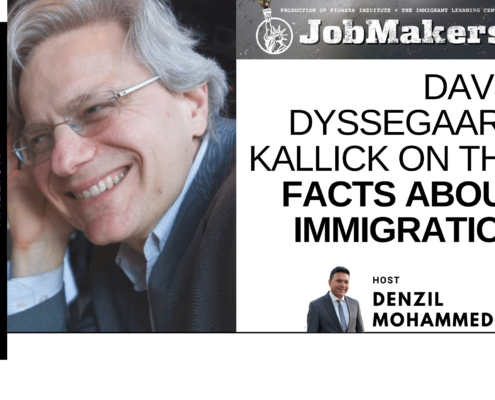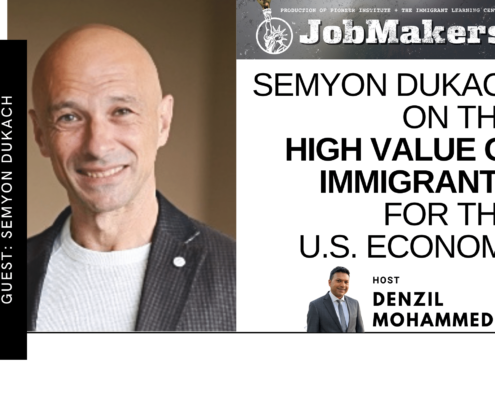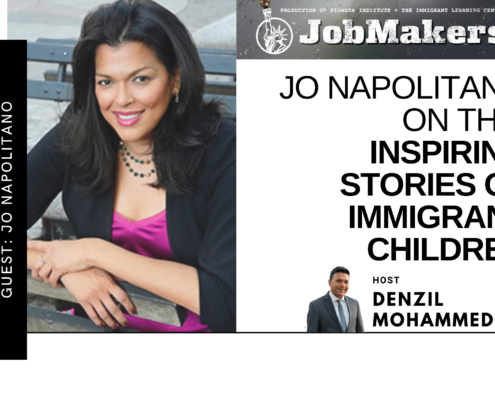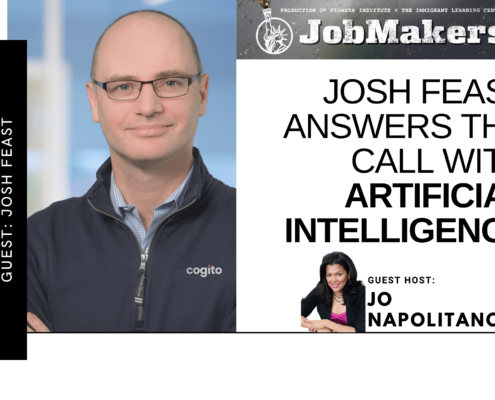Julianne Zimmerman on the Inventive Legacies of Immigrants
/in Economic Opportunity, Featured, JobMakers /by Editorial StaffThis week on JobMakers, host Denzil Mohammed talks with Julianne Zimmerman, managing director at Reinventure Capital, lecturer on Social Entrepreneurship at Tufts University (and named to Forbes’ 2022 “50 Over 50” list). Julianne sees first-hand how immigrants collaborate with the U.S.-born to create meaningful inventions that solve real problems – but how rhetoric, policy, and an outdated system can shut them out. Julianne now heads a firm that invests solely in companies led and controlled by Black, Indigenous, people of color and female founders. She discusses why she believes it is crucial that we work together to bring about much-needed social and economic change, and resist efforts to close ourselves off – as you’ll hear in this week’s JobMakers.
Guest:
 Julianne Zimmerman is Managing Director of Reinventure Capital, which invests in U.S.-based companies led by people of color and/or women. For over 25 years, she has been putting technology and capital to work for the greater good in the US and abroad. Along the way she has contributed in a variety of roles: Co-Founder of a seed-stage investment firm; VP of Communications at a utility-scale energy storage company; Co-founder and Director of Business Development of a biofuel company; VP of Engineering at a water purification company; and trusted mentor, board member, advisor, or consultant to many more. She invests heavily in cultivating community, including as a mentor with the MIT Venture Mentoring Service and life deacon in her church; she created and teaches a top-rated course on Innovative Social Enterprises at Tufts University. Julianne speaks and writes for a wide variety of domestic and global audiences. She earned two undergraduate degrees from MIT (Aero/Astro Engineering and Literature / Humanities), an MS from the University of Maryland, and an executive certificate in sustainability management from the Presidio Graduate School. She previously volunteered as a certified Emergency Medical Technician in Maryland (PGFD 1) and Massachusetts (Boston Marathon finish line medical services); she served as a research diver at the University of Maryland Space Systems Laboratory. She was twice a finalist in the NASA astronaut selection process and a 2020 Conscious Company World Changing Woman.
Julianne Zimmerman is Managing Director of Reinventure Capital, which invests in U.S.-based companies led by people of color and/or women. For over 25 years, she has been putting technology and capital to work for the greater good in the US and abroad. Along the way she has contributed in a variety of roles: Co-Founder of a seed-stage investment firm; VP of Communications at a utility-scale energy storage company; Co-founder and Director of Business Development of a biofuel company; VP of Engineering at a water purification company; and trusted mentor, board member, advisor, or consultant to many more. She invests heavily in cultivating community, including as a mentor with the MIT Venture Mentoring Service and life deacon in her church; she created and teaches a top-rated course on Innovative Social Enterprises at Tufts University. Julianne speaks and writes for a wide variety of domestic and global audiences. She earned two undergraduate degrees from MIT (Aero/Astro Engineering and Literature / Humanities), an MS from the University of Maryland, and an executive certificate in sustainability management from the Presidio Graduate School. She previously volunteered as a certified Emergency Medical Technician in Maryland (PGFD 1) and Massachusetts (Boston Marathon finish line medical services); she served as a research diver at the University of Maryland Space Systems Laboratory. She was twice a finalist in the NASA astronaut selection process and a 2020 Conscious Company World Changing Woman.
Get new episodes of JobMakers in your inbox!
Read a Transcript of This Episode
Please excuse typos.
Denzil Mohammed:
I’m Denzil Mohammed, welcome to JobMakers.
Denzil Mohammed:
If ever we were to have an intellectual conversation about US immigration, what would we talk about and what would result? The data shows without a doubt that all the people of this country benefit from the dynamic influence of drive and talent, particularly in STEM and as innovators and business owners. So what are we doing here for Julianne Zimmerman, managing director at Reinvent Capital lecturer on social entrepreneurship at Tufts University and named to Forbes’s 20 22 50 list? She sees firsthand how immigrants collaborate with the US born to create meaningful inventions that solve real problems, but also how rhetoric policy and an outdated system can shut them out in his storied nearly 40 year career. Julianne, who now heads a firm that invests solely in companies led and controlled by black, indigenous people of color and female founders, has come to a place where it is crucial that we work together to bring about much needed social and economic change. But this won’t happen if we close ourselves off. It’s time to have a real intellectual conversation on immigration. She says, as you hear in this week’s job makers, Julianne Zimmerman, managing director at Reinvent Capital in Boston, lecturer at Tufts University on social entrepreneurship, and most recently, Forbes 50 over 50 when it comes to money in 2022. Welcome to the Job Makers podcast. How are you?
Julianne Zimmerman:
Thank you so much, Denzil. I’m delighted to be here with you today.
Denzil Mohammed:
So your resume is very, very long. It’s several legal size pages long
Julianne Zimmerman:
<Laugh>.
Denzil Mohammed:
But one thing that caught me in one of your bios is you included a quote from the late greatLeila Janah. Yes. And she says, our best hope for a bright future for all the citizens of the world and for our planet lies in dissolving the traditional barriers we’ve drawn between doing good and doing good business.
Julianne Zimmerman:
Yeah.
Denzil Mohammed:
What does that mean, and why is that important now?
Julianne Zimmerman:
Well, I think first of all, Leila was fantastic. She was a brilliant entrepreneur, and, and she was an unapologetic social entrepreneur both as a founder of a for profit social enterprise, and as the founder of a nonprofit social enterprise. She was extraordinarily articulate in, in naming these issues, but also she was extremely effective in demonstrating that it is not only possible, but, that is a fantastically valuable way to approach the, the premise and the, the operation of social of, excuse me, of enterprise in general. And why it’s important is because I think that collectively we all swallowed whole, the, the dictum that Friedman laid out more than a half century ago when he said that the purpose that one and only purpose of business is to return value to shareholders. That was an idiotic statement when he made it. It was obviously not true, and yet somehow it became dogma.
Julianne Zimmerman:
I think we know from experience that the very best companies are ones which create value for all of their stakeholders, not merely for their shareholders. And I think that we are just now kind of depending on how you think about it, waking up from that delusion or, or maybe, you know coming to terms with the fact that we swallowed something that didn’t agree with us <laugh>. But, but there are so many examples, not only Lila’s excellent example, but so many examples that show us that in fact the best companies are the ones which focus on the value they create for all of their stakeholders.
Denzil Mohammed:
As a managing director at Reinvented Capital, how does Lila’s sentiment what, what is relationship and why is it important for us to invest for better financial returns and better social outcomes?
Julianne Zimmerman:
The the fact is we have a large and, and ever expanding body of analysis and research at this point from the likes of McKinley, excuse me, McKinsey and Morgan Stanley and numerous others. That fairly consistently concludes that the existing status quo are our systems of finance focused as they are narrowly exclusively on this notion of business only to generate financial returns, have not only underperformed as a result, but have also left economic, social and environmental harms in their wake. And so the premise that companies have no responsibility or that investors have no responsibility for those harms is increasingly coming into question, and I think should be scrutinized very skeptically. Right? The, I think that for us at Reinventor, we know, again, that not only is it possible, but, but it’s the best scenario to invest in companies that become economic engines, companies that create economic value, that create positive impacts for their, not only for their investors and their founders, but but equally importantly for their customers and their partners and their employees and, and the communities in which they operate.
Denzil Mohammed:
So reinvention seeks to level the playing field in a sense because we know through the research that and just through day to day interactions that women and people of color are generally don’t figure in as highly in the C-Suite offices. Mm-Hmm. <Affirmative>. So how does, what does reinvention capital do and, you know, talk us, tell us a little bit about some of your, the people you’ve invested in.
Julianne Zimmerman:
Sure. So first of all, our investment thesis, our strategy is very nearly orthogonal to the rest of the venture community. We are a venture investment practice, but we use venture capital in a very different way than our conventional VC peers. So, reinventor invests exclusively in US based companies that are led and controlled, both led and controlled by Bipo and or female founders. And we invest in those companies when they are at or on the cusp of break even, and we work with them to help them grow more profitably. Moreover, as part of our investment terms, we also bind ourselves and the companies we invest in, that they will continue to hire, promote, and compensate equitably at all levels of the organization as they grow. And we also commit to their strategic impact objectives, whatever those may be. And one of the things we find is that very often founders are actively discouraged by other investors from even talking about impact objectives.
Julianne Zimmerman:
And that discouragement often comes in the form of a statement like, listen, it’s hard enough to grow a successful business. Don’t ld on extra difficulties or distractions. Just grow a company and make a lot of money, and then you can give it away as much as you wish. Right? Which is a very, again, a, a very narrow, and, and we think ultimately unproductive way to think about growing high value businesses. And if you look at companies like Uber, for example, often held up as examples of merit, right? Here’s a company that is riddled with scandal and, and has litany of complaints from employees and customers alike about mistreatment, right? We see that as, as part and parcel of that notion of just make as much money as you can and then, you know, figure out how to be a decent human being or a, you know, a positive force as a company later.
Julianne Zimmerman:
And so we invest very explicitly in, in a very different direction. So the companies we invest in, we’ve invested in seven so far in this portfolio. We’re about halfway through investing this fund. And the companies we’ve invested in are in wide variety of sectors, and they are scattered across the US geographically. So we have invested in companies, in digital media and in clean energy and in clean water and in FinTech. And we are currently looking at companies in sorry. We’ve also invested in a, a vr, ar company. We are in looking at companies in ed tech and in health related propositions, services and technologies, and we see a really fantastically rich deal flow.
Denzil Mohammed:
How do immigrant founders fit into your work, into your portfolio?
Julianne Zimmerman:
Well, as you know, Denzel immigrant founders punch above their weight statistically, right? So a significant fraction of successful companies founded in the us whether we’re talking about high growth companies, like the kinds we invest in, or whether we’re talking about the kinds of companies that are really the anchors of local economies, those, you know, brick and mortar businesses that really give and sustain the life of communities, right? So immigrant entrepreneurs are a s you know, a significant fraction of the founders we encounter and, and contemplate investing behind. Specifically in our portfolio so far, I’d love to highlight two women. One, Isabelle Zal Ra, who is the founder and CEO of Cane Media. She’s, by the way born in Mexico. Canella Media is a digital media company serving Spanish language audiences in the US and across the Americas. And she has just been doing a phenomenal job of growing that company in a sector, which many people said was already too crowded for any new entrance to be successful.
Julianne Zimmerman:
So not only has she demonstrated a unique vision and an extraordinary ability to execute but she’s also racking up significant honors for her accomplishments as the founder ceo in, in the digital media sector as well, as most recently, she was an EY entrepreneur of the year, and was named the US National Entrepreneur of the Year for Emerging Enterprises. Just last week. The other person I’d love to highlight is Dr. Fatima Shirazi, who’s the founder and CEO of Mike Croy. Mike Croy is a, a clean water and, and broader technology platform company to provide a what they call a micro niche platform using microbes to process a wide variety of industrial or municipal or or other outflows. And Dr. Shirazi is originally from Iran, and her team, again, has developed an extraordinary platform already in the water and wastewater segment. It provides a solution that, that delivers superior performance to all the available alternatives at about an eighth of the price. So when we think about the issues of water and wastewater that are already severely impacting many of our communities, and that are predicted to begin severely impacting many more of our communities in just the next few years, this is an extremely important innovation,
Denzil Mohammed:
Given your observations having been in this field field for more than 25 years given the fact that these immigrants come from different, entirely different countries. So, you know, you mentioned Iran as one of them for sure. They have to, they have different challenges but they also have different skills that they come with. What have been some of your observations for the immigrant founders that you’ve, that you’ve worked with over the years?
Julianne Zimmerman:
Well, I will say that this is a kind of bad news, good news story. So first of all, many of the immigrant entrepreneurs, I, I know separate from the two I’ve mentioned in represented in our portfolio, are extraordinarily gifted as founders, in part because they have had to overcome extremely difficult circumstances. And, and so that’s why I think of it as a bad news, good news thing, because the fact that, that they’ve had to overcome extraordinarily difficult circumstances is not great. We would not like for people to come to the US because they are coming from difficult circumstances. And to be clear, obviously, not all immigrants come from difficult circumstances, but many I’ve met have, have come to the states because they, or because their parents were fleeing their home countries. And, and so I think that’s a, that’s a part of it.
Julianne Zimmerman:
But, but also one of the things that, that I see over and over, and again, whether people came to the US voluntarily or whether they came to the US in distress either way, as families, they have demonstrated over and over again a an abiding strong commitment to create value, to create legacy, to create something of, of lasting and significance and, and, and not necessarily, or not merely to figure out how to get wealthy very quickly, although obviously creating wealth matters, but, but there’s a, a, a very consistent commitment to creating something that has meaning and purpose and, and lasting significance, not something merely transient. And, and again, you know, when I think about what the very best companies have in common, it’s, it’s that principle or, or that philosophy that, that these companies exist not merely to find a way to generate a profit, but also to generate that profit by doing good in the world, by creating solutions to unmet needs or unsolved problems.
Denzil Mohammed:
But you talk about inflows and the benefits of that constant constant inflow of talent and determination and drive we up, they’re up against something called the US Immigration System Oh,
Julianne Zimmerman:
Yes.
Denzil Mohammed:
Which has not been transformed in so many years. It’s clearly very outdated. And the benefits to immigrants and to the receiving communities is so well established that, you know, the idea of putting America first meaning to, to restrict everyone else we know that that shoots us in the foot. It does not, it is not to our benefit at all. Do you really think that restrictionist policies put Americans first given the high rates of entrepreneurship and innovation and the increase in US borne innovation as a result of multiple talents being around?
Julianne Zimmerman:
I think that’s the, the xenophobia that is often tied to a kind of nationalism that, that likes to whitewash American identity and American history is very narrowly self-serving for a very, very small segment of the population. But even then, and this is sort of embedded in your question, I think even then that narrow self-interest is ultimately defeated by the simple fact that were we to completely close our borders, were we to completely shut down immigration that would harm everyone in the United States. It would harm all of us. And I think that unfortunately, we don’t typically have a, a very, a grown up conversation about immigration in the United States. It’s usually like immigration, bad immigration, good <laugh>, <affirmative> and, and we don’t typically have a conversation about why and how and where and when immigration is vitally important and why, and how, and where and when it’s challenging. And, and I think we, we tend not to have that conversation in a, in an intellectually honest way, right? About how do we practice immigration in a way which is thoughtful and and practical, and which takes into account the fact that we are dependent on immigration but does so in a way which is humane for immigrants and, and which in it actually encourages and enables the receiving communities to embrace immigrants and, and thrive together with them, with their new neighbors, as opposed to seeing them as, you know arriving foes or enemies,
Denzil Mohammed:
<Laugh> and intellectual conversation. Immigrants are the reason many schools can sustain their STEM programs. Mm-Hmm. <Affirmative>, I mean, think about that. We are a nation that has always been innovating, but we’ve depended on people from everywhere who wanted to innovate, but innovate here. My boss came here when she was three years old, and she started an incredible organization that celebrated 30 years this year.
Julianne Zimmerman:
Congratulations again, by the way. It’s fantastic.
Denzil Mohammed:
Julianne Zimmerman, managing director at Reinventor Capital, lecturer in social entrepreneurship at Tufts University, and of course, Forbes 50 over 50 list. Thank you so much for joining us on the Job Makers podcast.
Julianne Zimmerman:
Thank you. Denzel.
Denzil Mohammed:
Job Makers is the weekly podcast about immigrant entrepreneurship and contribution produced by Pioneer Institute, a think tank in Boston, and the Immigrant Learning Center in Malden, Massachusetts, a not-for-profit that gives immigrants a voice. Thank you for joining us for this week’s exploration of how immigration enriches us all. If you know an outstanding immigrant business owner or innovative, we should talk to email Denzil. That’s d e n z i l@jobmakerspodcast.com. I’m Denzil Mohammed. See you next Thursday at noon for another Jobmakers.
Recent Episodes:

David Dyssegaard Kallick on the Facts about Immigration

Ely Kaplansky Goes from Immigrant to Inc. 5000 Insurance Entrepreneur

Semyon Dukach on the High Value of Immigrants for the U.S. Economy

Jo Napolitano on the Inspiring Stories of Immigrant Children

Umesh Bhuju Seeks a Fair Deal for Immigrants, Farmers & the Environment

Dr. Babak Movassaghi on Winning in Football & Healthcare Innovation

Jitka Borowick on Starting a Small Business during COVID




